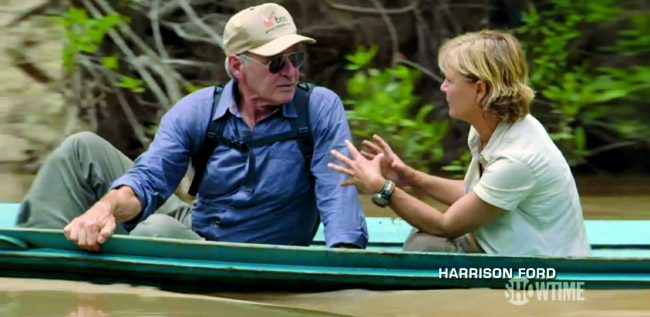
Max Boykoff’s media and climate change work referenced in a Columbia Journalism Review article on the new Showtime documentary series on climate change:
Almost famous
Can a star-studded documentary series make people care about climate change?
by Alexis Sobel Fitts.
Olivia Munn slinked into the airy lounge of Seattle’s Columbia Center as if she were trespassing on someone else’s film set. In truth, the actress had agreed to the shoot—part of an ambitious new documentary about climate change—out of benevolence, and was running late. The crew had already installed lights around a corner window, selected for its view of the Space Needle, and settled into a shuffleboard game with Jigar Shah, the green-energy expert Munn was scheduled to interview. On The Newsroom, Munn oozes gravitas—her character, an economics reporter, is known for her curt summaries of statistics. But in over-the-knee boots and a plaid sweater-coat, she appeared airbrushed, more starlet than newshound. “I apologize to everyone for the delay,” she said. “I didn’t get to sleep until 3am.”
Joel Bach, one of the film’s creators and executive producers, gave a nervous laugh. For months his production team had been briefing Munn on the story she was now expected to narrate. It would involve, of all things, coal. Specifically, a series of terminals slated to be built near Bellingham, WA, just over a hundred miles north of Seattle. It’s a complicated, wonky story, and Munn is no coal expert. She had given the crew 36 hours of her time, during which she’d film while being brought up to speed on the coal debate, a process that began immediately with a summary of cap and trade.
Munn reacted to the concept with surprise. “It’s like, I have to give you $10,000, but I get to decide where it goes?”
Bach nodded.
“That’s bullshit, Joel,” she said. “Are you kidding me? I could say it goes to my charity, Olivia Munn, Incorporated. I call bullshit on that.”
Invigorated by the exchange, Munn plopped herself across from Shah for a conversation about the economics of renewable energy. But unlike a normal interview, the revelations came mostly from the interrogator, offered in one-liners:
“Either way China’s our dad, right? Cause we either sell them our coal or we sell them our jobs.”
“Solar energy equals more jobs equals awesome.”
Munn ended the interview by quipping that she and Shah should run for governor, suggesting a team name: Jigamunn. “Oh my gosh, this is a win,” she cooed.
The sound guy looked flustered, but Bach seemed relieved. “She doesn’t sound like a journalist at all,” he said to no one in particular. “She’s great.”
Three years ago, when Bach and David Gelber, the film’s other co-creator and executive producer, left their jobs as producers at 60 Minutes to launch a television documentary series dedicated to climate change, colleagues told them they were crazy. The last mainstream documentary anyone had made on the subject was 2007’s An Inconvenient Truth. Al Gore’s film launched global warming into the public sphere but spawned few imitators—even as reports on the consequences of climate change grew more pronounced. The films that did make it to market in the wake of Gore’s effort failed to attract eyeballs outside of special-interest circles. And worse, most were boring.
But Bach and Gelber’s idea was that celebrity charisma could make a topic like coal leap off the screen and demand attention on a national scale. Their project tackles the story of global warming by sending a roster of famous people sashaying around the globe, filming segments about climate refugees in Bangladesh and the political battle over deforestation in Indonesia. Shortly after they quit their day jobs, Bach and Gelber had recruited an arsenal of A-list celebrities—names like Matt Damon, America Ferrera, Harrison Ford, and Jessica Alba—and convinced Jerry Weintraub and James Cameron to join as executive producers. The series, the first season of which airs on Showtime in April, even has an appropriately larger-than-life name: Years of Living Dangerously. Read more …

